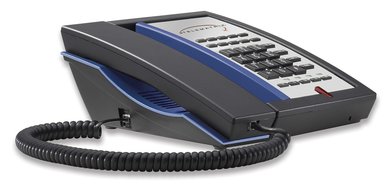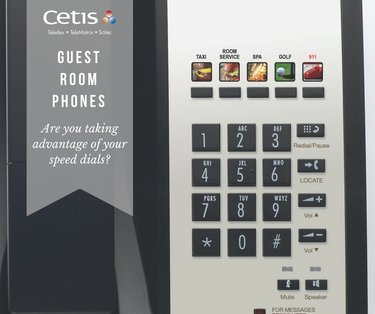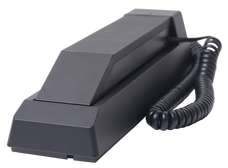Cetis eNewsletter
February 2017
Click on the Opt-In button to subscribe to receive the Cetis eNewsletter via email. Click here to browse the Cetis eNewsletter archive.
Petit Palace Alcalá Torre hotel installs Teledex M Series phones.
Teledex M Series trimline phones leverage VoIP technology in a small footprint.

Cetis, Inc., manufacturer of Teledex, TeleMatrix, and Scitec brand analog and VoIP telephones, has announced the installation of 258 Teledex M Series M100IP-TRM single-line VoIP guest room telephones by partner IP+D Hospitality Solutions (IP+D) at the beautiful Petit Palace Alcalá Torre Hotel in Madrid.
Located in Madrid's first skyscraper, the famous building La Unión y el Fénix, the The Petit Palace Alcalá Torre Madrid Hotel is situated only steps away from the Puerta del Sol. Modern and comfortable, the Petit Palace Alcalá Torre Madrid is ideal for romantic getaways or for a trip with friends: free wifi, laptop in the room, daily newspapers, buffet breakfast.
According to Josep Lluis Marquez, Managing Director, IP+D, “Teledex M Series is an integral component of a well-designed, contemporary guestroom that delivers an enhanced in-room telephone and media experience. Deploying the space-saving M Series VoIP trimline phone provides saves space on the nightstand or desk for the hotelier, and drives telecom savings via VoIP technology,” he concludes.
"The new Teledex MTrim uniquely leverages an angular design, and rich VoIP feature set in a small footprint that fits easily on the nightstand or desk, making it an ideal solution for this application" says Hui Du Le-Ngoc, Managing Director, Cetis (EA) Ltd. "The M Series trimline is
Located in Madrid's first skyscraper, the famous building La Unión y el Fénix, the The Petit Palace Alcalá Torre Madrid Hotel is situated only steps away from the Puerta del Sol. Modern and comfortable, the Petit Palace Alcalá Torre Madrid is ideal for romantic getaways or for a trip with friends: free wifi, laptop in the room, daily newspapers, buffet breakfast.
According to Josep Lluis Marquez, Managing Director, IP+D, “Teledex M Series is an integral component of a well-designed, contemporary guestroom that delivers an enhanced in-room telephone and media experience. Deploying the space-saving M Series VoIP trimline phone provides saves space on the nightstand or desk for the hotelier, and drives telecom savings via VoIP technology,” he concludes.
"The new Teledex MTrim uniquely leverages an angular design, and rich VoIP feature set in a small footprint that fits easily on the nightstand or desk, making it an ideal solution for this application" says Hui Du Le-Ngoc, Managing Director, Cetis (EA) Ltd. "The M Series trimline is
|
available in single and two-line analog and VoIP configurations for both desk and wall mount applications," he concludes.
To book reservations at the Petit Palace Alcalá Torre, write [email protected], or call +44 (0) 2034995871. For Teledex telephone product and pricing details contact IP+D Hospitality Solutions at +34 911 851 044, write [email protected], or visit www.teledex.com. |
MF Communications partners with Cetis to supply phones to hotel sector.
Leading UK telecom reseller now an authorised distributor of Teledex and TeleMatrix phones.
 TeleMatrix 3300 Series
TeleMatrix 3300 Series
Leading UK telecoms reseller, MF Communications, is now an authorised distributor of Teledex and TeleMatrix brand phones, the guest phones used by a large number of hotels.
According to Ben Capas, Director of MF Communications, “We continually look to improve our service to customers, and adding Cetis to our portfolio means we can offer an even wider choice. We already work with a number of businesses in the hospitality sector, so this is another chance for us to expand our reach into this industry”, he concludes.
With almost 17 years in the telecommunications industry, hardware experts and network services provider, MF Communications, can advise on and supply the complete Teledex and TeleMatrix ranges across the UK and globally. With more than 30 years of manufacturing analogue and IP hotel phones, Cetis phones are preferred or approved by leading hotel groups, and 300,000+ hotel VoIP phones are installed worldwide. The Teledex and TeleMatrix models are interop-certified with all major PBX, IP-PBX and Cloud phone system providers, including Alcatel-Lucent, Avaya, Cisco, Mitel, NEC and Unify.
“We are delighted to be working with MF Communications to supply TeleMatrix and Teledex phones in the UK, says Hui Du Le-Ngoc, Managing Director, Cetis (EA) Ltd. This partnership gives our loyal customer base and new businesses the opportunity to purchase from a reputable reseller”.
To purchase Telematrix or Teledex telephones, or to discuss your requirements, contact MF Communications at +44 (0) 1892 514687, visit www.mfcomm.co.uk, or contact a Cetis (EA) representative at +44 (0)1908 904860.
According to Ben Capas, Director of MF Communications, “We continually look to improve our service to customers, and adding Cetis to our portfolio means we can offer an even wider choice. We already work with a number of businesses in the hospitality sector, so this is another chance for us to expand our reach into this industry”, he concludes.
With almost 17 years in the telecommunications industry, hardware experts and network services provider, MF Communications, can advise on and supply the complete Teledex and TeleMatrix ranges across the UK and globally. With more than 30 years of manufacturing analogue and IP hotel phones, Cetis phones are preferred or approved by leading hotel groups, and 300,000+ hotel VoIP phones are installed worldwide. The Teledex and TeleMatrix models are interop-certified with all major PBX, IP-PBX and Cloud phone system providers, including Alcatel-Lucent, Avaya, Cisco, Mitel, NEC and Unify.
“We are delighted to be working with MF Communications to supply TeleMatrix and Teledex phones in the UK, says Hui Du Le-Ngoc, Managing Director, Cetis (EA) Ltd. This partnership gives our loyal customer base and new businesses the opportunity to purchase from a reputable reseller”.
To purchase Telematrix or Teledex telephones, or to discuss your requirements, contact MF Communications at +44 (0) 1892 514687, visit www.mfcomm.co.uk, or contact a Cetis (EA) representative at +44 (0)1908 904860.
Everything's under control.
What drives your hotel phone sourcing decisions?

While the main objective of strategic sourcing may be to reduce costs, supplier performance and minimizing risk are equally important.
In fact, many corporate procurement organizations are playing pivotal roles in the success of global firms in ways that purchasing managers could never have imagined.
Need a proven, dependable, full-line hotel phone supplier? We support an installed base of 30+ million hotel phones globally, including 3+ million in-warranty phones. Click here to arrange a consultation.
In fact, many corporate procurement organizations are playing pivotal roles in the success of global firms in ways that purchasing managers could never have imagined.
Need a proven, dependable, full-line hotel phone supplier? We support an installed base of 30+ million hotel phones globally, including 3+ million in-warranty phones. Click here to arrange a consultation.
Hotel-Online News
Why cities should care about developers' cost of capital.
The public sector’s role in a public-private partnership often includes providing some form of financial or tax incentive.

By Hans Detlefsen
Although many communities have identified the need for a new hotel or conference center, market demand may not be sufficient to cause the private sector to develop such projects.
If developers expect a project’s costs will exceed its investment value, then a “feasibility gap”[1] may prevent the private sector from investing in the project. Public-private partnerships can be an effective means to initiate economic development projects of this nature.
The public sector’s role in a public-private partnership often includes providing some form of financial or tax incentive to close a feasibility gap between a developer’s total project cost and the estimated value of the completed development. The Appraisal Institute[2] provides the following definition of economic feasibility: An investment’s ability to produce sufficient revenue to pay all [project] expenses and charges and to provide a reasonable return on and recapture of the money invested.
What can public sector officials do to minimize the need for subsidies? How can governments get the biggest bang for their buck?
This article will focus on one key metric to determine which potential developers are likely to require the smallest and largest subsidies. This sometimes-overlooked metric, the “cost of capital” to developers, can be a critical factor in determining the amount of public subsidy a given developer will need for a defined project. A strategy to minimize public subsidies involves seeking the most qualified developer who also has the lowest cost of capital. Although such a strategy may be applicable to many development types, this article pertains specifically to the relevance of determining developers’ costs of capital in the context of developing hotels.
When public sector officials identify hotel development projects as priorities, they typically seek private sector expertise and investment to help develop the project. To initiate the search for a development partner, public officials often rely on a competitive process, such as a Request for Proposals (RFP), to solicit development proposals from private sector developers. Such RFPs typically aim to identify a private-sector stakeholder to develop, own, and operate the proposed property as part of a public-private partnership.
Click here to read the entire article at Hotel-Online.
Although many communities have identified the need for a new hotel or conference center, market demand may not be sufficient to cause the private sector to develop such projects.
If developers expect a project’s costs will exceed its investment value, then a “feasibility gap”[1] may prevent the private sector from investing in the project. Public-private partnerships can be an effective means to initiate economic development projects of this nature.
The public sector’s role in a public-private partnership often includes providing some form of financial or tax incentive to close a feasibility gap between a developer’s total project cost and the estimated value of the completed development. The Appraisal Institute[2] provides the following definition of economic feasibility: An investment’s ability to produce sufficient revenue to pay all [project] expenses and charges and to provide a reasonable return on and recapture of the money invested.
What can public sector officials do to minimize the need for subsidies? How can governments get the biggest bang for their buck?
This article will focus on one key metric to determine which potential developers are likely to require the smallest and largest subsidies. This sometimes-overlooked metric, the “cost of capital” to developers, can be a critical factor in determining the amount of public subsidy a given developer will need for a defined project. A strategy to minimize public subsidies involves seeking the most qualified developer who also has the lowest cost of capital. Although such a strategy may be applicable to many development types, this article pertains specifically to the relevance of determining developers’ costs of capital in the context of developing hotels.
When public sector officials identify hotel development projects as priorities, they typically seek private sector expertise and investment to help develop the project. To initiate the search for a development partner, public officials often rely on a competitive process, such as a Request for Proposals (RFP), to solicit development proposals from private sector developers. Such RFPs typically aim to identify a private-sector stakeholder to develop, own, and operate the proposed property as part of a public-private partnership.
Click here to read the entire article at Hotel-Online.
Guest service key revenues.
What do hotel phone guest service keys actually contribute to a hotel’s bottom line?

If hotel guests need a wake-up call, advice on getting clothes cleaned, or fresh towels, they pick up the hotel guestroom phone, push a single button and get what they want. This is a guest convenience that is simple, fast, and -- most of all – expected.
Information provided to Cetis by a major, full-service Los Angeles hotel reveals that room service orders total as high as 65,000 annually. All were ordered on room phones using single button pushes. Now imagine that the average room service order totals $20. Those 65,000 calls at $20 equals $1.3 million dollars in room service orders, thanks to that convenient single button on the room phone.
Let us help you ensure a positive guest experience, and drive new telecom revenues with guest service key equipped Cetis room phones. Click here for details, here to request a quotation, or here to arrange a consultation.
Information provided to Cetis by a major, full-service Los Angeles hotel reveals that room service orders total as high as 65,000 annually. All were ordered on room phones using single button pushes. Now imagine that the average room service order totals $20. Those 65,000 calls at $20 equals $1.3 million dollars in room service orders, thanks to that convenient single button on the room phone.
Let us help you ensure a positive guest experience, and drive new telecom revenues with guest service key equipped Cetis room phones. Click here for details, here to request a quotation, or here to arrange a consultation.
Tune in to the Cetis blog.

Click here to visit and bookmark the Cetis blog page. Keep up-to-date on emerging Cetis news, features, white papers, books, brand standards, product announcements, trade show activities, industry developments, and much more. Have limited time to read? Browse the Cetis blog library by archive date, or quickly research and select articles from our growing database of nearly 100 hotel phone and hospitality industry category titles conveniently displays along the right column of the blog.
Visit with us on LiveChat.

Did you know that you can receive online assistance with product, pricing, support of Cetis hotel phones? The Cetis Account Manager team is here to help you with any hotel phone-related questions that you may have – before, during, or after your purchase. You may find the LiveChat feature on the lower right side of our Cetis, Teledex, TeleMatrix, and Scitec websites. We look forward to chatting with you!



